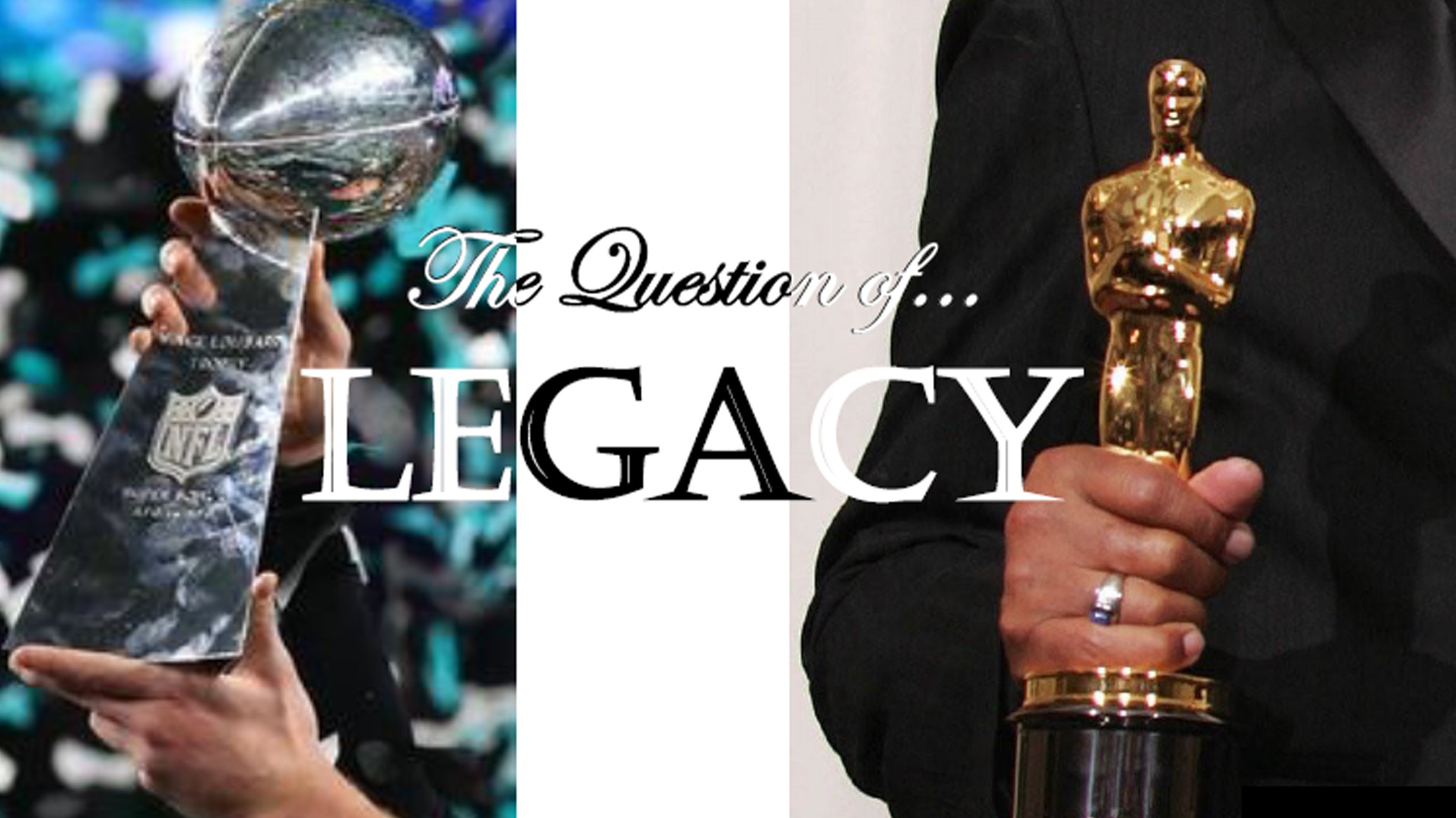
06/02/2019 by Alister albert 0 Comments
The Question of Legacy
On the evening of the 53rd edition of the always electric Super Bowl Sunday, I sat thinking about the countless reports linked to the National Football League’s poster boy Tom Brady and his improbable streak of success that has spanned his 18-year professional career. Vying for his unprecedented 6th Super Bowl title, in his 9th overall appearance in the American Football final is an unbelievable feat! (Just a heads up, numbers and their perceived importance will play a part later on in this piece!). Brady’s status as an all-time great championship Quarterback and leader is unquestionably secure. Many around the world regard him as the G.O.A.T - greatest of all time - at the Quarterback position or arguably, the best player who ever lived and played this game…period! A win on this day (which was accomplished after the time of this writing) would put him, his coach and team, the New England Patriots, in rarefied air; tying him and them with the Pittsburgh Steelers as the winningest entities in the history of the sport to win 6 Super Bowls.
In typical Actors’ Post comparative fashion, it made me wonder how “wins,” the accumulation of championship hardware and individual accolades (which all are the seeming athletic baselines for measuring and cementing historical relevance) translates to the acting and entertainment world. Due to the calendar proximity between the Super Bowl and the Oscar Awards being only a few weeks, the eyes of the world will rapidly shift from one spectacle to the other. The concentration on the Tom Brady led New England Patriots and Jared Goff’s Los Angeles Rams and its aftermath, will almost instantly transfer to the Hart-less and now officially host-less entertainment awards ceremony.
Arguably, winning the “alternative vote” and subjectively awarded but extremely coveted Oscar statuette in the acting and entertainment realm equates to winning the industry’s own version of the Vince Lombardi trophy, which is received by the Super Bowl champions. February 24th 2019 and every other previous or subsequent scheduled date for this event is the Oscar’s version of the Super Bowl. Just a lot more elegant and less sweaty!
Upon receiving the award, actors, directors and those earning it are thusly expected (or at least, it is hoped) to continue an upward trajectory towards greatness (which may include more Oscar nominations and wins) or perhaps further validate their mettle and lustre as seasoned, past winners, while continually building a glorified aura in the industry. Walking across the stage to receive “Uncle Oscar” is basically where careers are supposedly defined and perceptions cemented at that time and maybe even for years to come.
Winning ultimately transcends both disciplines of sport and entertainment; the two being a lot more intertwined commercially than most may know, or would care to admit (that’s another story for another website though). The rate of winning or even how often one continually misses the opportunity to hoist that trophy and give an acceptance speech usually and automatically leads to one word being heavily weighed upon…
Legacy.
In sports, legacy is closely defined (maybe more now, than ever before) not just by dominance in a particular situation or the position which one plays but almost strictly by the amount of championships you win, hardware accrued over a relatively small career window and long-term impact on the game being played. It’s why Kevin Durant becoming a Golden State Warrior happened and why LeBron James is probably one of the most polarising athletes in North America (and/or the world) as he continues to disputably orchestrate his chances to climb the championship ladder and chase “ghosts.”
In the acting world this is also true, with actors amassing numerous awards for performances and adding trophies to their mantles. This almost equates to, or mirrors the efforts of their athletic counterparts.
But how do you define legacy in an industry where handing the winner’s trophy is almost derived from a subjective undertaking, determined by the opinions of a panel of Academy members (a.k.a. “judges”)? There isn’t a standard, clear or real-time defining measurement for winning like in sports, where being victorious usually means having the most points, as time expires, like in the NBA Finals, or winning the Super Bowl (as the Patriots did just a few days ago). Some would surely debate this vigourously but this seeming summation of “points” based on subjective opinions of Academy members, on what I would assume are various elements of actors’ performances, leaves much room for scrutiny and discussion.
Here’s an example for thought when considering legacy in the entertainment industry; where does Charlie Chaplin sit in the pantheon of acting legends? Or, Samuel L Jackson? Or Tom Cruise? It’s hard to say without acknowledging specifically that Chaplin is undoubtedly an acting great and a revered pioneer in the industry. Ironically, a sports columnist, Greg Cote of the Miami Herald insists that Chaplin should still be considered an A-lister and an icon in modern times because he was such a pioneer of film and paved the way for so many actors in the early 20th century. But how does Chaplin’s impact measure-up or even equate to Katharine Hepburn, the winningest actress (or actor) ever, with 4 Oscar wins or Jack Nicholson and Meryl Streep also near the top of the “all-time” leader board, with 3 Oscar wins? This highlights one of three things. Firstly these statues (for acting specifically and for the purposes of this article) are damn hard to get. Secondly, it is further complicated as actors/actresses can win the awards in 2 major categories - Best Actor/Actress or Best Supporting Actor/Actress and not just one end-all-and-be-all category like “Best Actor…Period!” Finally, it’s hard to compare actors from different eras and generations and to have that conversation on whether someone is part of the “greatest ever” discussion. It is bound to end up in disagreement, just like in...sports.
American actress Meryl Streep’s win-loss standings are hard to ignore however when scanning the “most wins” tables. Highly esteemed and having an illustrious acting career, she is respected for her stunning, riveting and golden performances in numerous productions. On the flip-side, she can also be seen as the “unluckiest” performer ever, having been nominated 21 times for an Oscar and “only” capturing 3. Considering that receiving one is like drawing blood from stone, having 3 unquestionably validates her superiority in the field. However, going back to the sporting analogy (which is basically unfair given the explanation of her sheer awesomeness above!) she analogously, has basically won 3 games out of 21! Some would say that’s disappointing or even go far as describing it as paltry.
Legacy, in the acting world dictates that she is near untouchable and almost above reproach for her accomplishments (and her other numerous awards that aren’t Oscars- she’s won A LOT folks!). Counter-intuitively, her 18 “losses” also corroborate her excellence, as to be nominated means you’ve been one of the best, each and every time. Therefore, her consistent appearances as a nominee only boost her argument and legacy despite all the losses, as being probably one of or even the best in the industry - male or female! Unforgivingly however, in the sporting world, for another angle on this, it could mean, though clearly gifted/great (as a nomination essentially equates to making it to a tournament final of some kind), she ostensibly has lacked the ability to “close” the deal and be the best. She’s constantly missed the game winning shot, at the buzzer!
In the cold, statistics-driven world of sports, that would be a damning indictment of just not being good enough or unlucky...or both! Ask LeBron James and Jerry West, two NBA greats from different times, who have been to the Finals a combined 18 times and between them have won 4 championship trophies (LeBron 3, Jerry 1); a telling stat when compared to the “gold standard” that Michael Jordan set, by winning 6 championships and never losing in an NBA Final. James and West are Hall of Fame-type players, as is Meryl Streep as an actress. Though their worlds are so vastly different and probably should not be compared, it’s hard not to make the comparison when statistical analysis leaves the gates open for scrutiny. Legacy is complicated when put under a microscope and compared. But legacy is also earned. From Katharine Hepburn to Michael Jordan to Meryl Streep to LeBron James, being dominant and at, or near the top of your discipline ensures veneration and future genuflecting in an ode to their admiration and acceptance.
Diamond encrusted and precious stoned rings, gold medals and gilded trophies are the spoils of a winner; the ultimate and validating possessions of champions! For as long as I remember, winning and the associated hardware linked to it, were what defined someone as being worthy of earning escalating levels of respect from his/her competitive peers, especially after notching multiple victories. Winning is one of the reasons why someone’s status elevates over time and why they deserve the opportunity and will inevitably be compared to the greatest persons who reached those same heights before them. Reaching the pinnacle and hoisting the hardware, linked to whatever discipline they competed in, is what cements their legacy.
Right?!
It’s debatable… and one debate that will never stop either in sports or entertainment.
So when you next consider legacy, think about Samuel L. Jackson, Tom Cruise and also Charlie Chaplin. Do their bare or lesser cabinets of Oscar wins dilute their legacy, alongside Streep, Nicholson and Hepburn? Or maybe, you may want to venture and complicate things further and consider that as a performer, John Legend recently became the became the first black male and one of the youngest artistes, at 39, to win an Emmy that included him in the hallowed and exclusive “EGOT” club (amongst the many other awards he’s received in his career). John Legend is the second fastest person in history to claim all four of the Emmy, Grammy, Oscar and Tony award trophies and joined an exclusive club of just 15 persons who have managed to win the fabled-four most prestigious awards in the entertainment industry. How does he stack up when considering a performance legacy, though he's primarily known as a singer? Apples and oranges, right? Or is "performance" all under the same umbrella?
It’s a topic and debate that could make this article stretch a lot more but one I will end here by saying legacy is and always will be subjective. However you choose to define it, using statistical measures, wins-losses, nominations translating into awards; achieving the right to be part of the discussions amongst greats, is an honour and everyone mentioned in this article here (except Jared Goff who has some more winning to do!) is worthy of a positive and earned legacy. Persistence and continued excellence always puts people in the conversation of being great. Just ask the “Iron Lady” Meryl Streep.

Comments